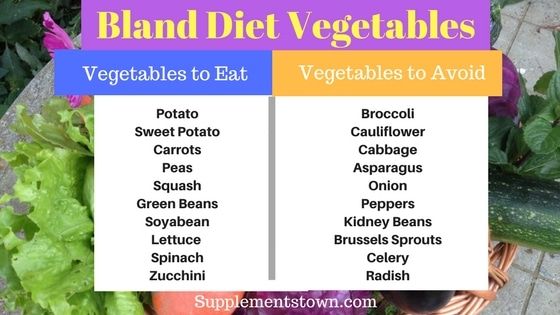A bland diet is a dietary approach that focuses on consuming gentle, easily digestible foods that are low in fiber, fat, and spices. It is commonly recommended for individuals with digestive issues, gastrointestinal disorders, or after certain medical procedures. In this article, we will explore the foods included in a bland diet, guidelines to follow, sample meal plans, benefits, health conditions that may require a bland diet, seasoning restrictions, recipe suggestions, and more.

What foods are included in a bland diet?
A bland diet primarily consists of foods that are gentle on the stomach and easy to digest. Here are some examples of foods typically included in a bland diet:
- Lean proteins: Skinless poultry, fish, tofu, and well-cooked eggs.
- Low-fiber grains: White rice, refined pasta, oatmeal, and plain crackers.
- Soft fruits: Bananas, applesauce, melons, and canned fruits in natural juice.
- Cooked vegetables: Carrots, green beans, potatoes, and squash.
- Dairy alternatives: Lactose-free milk, almond milk, and tofu-based products.
- Tender meats: Boiled or baked chicken, lean beef, and tender pork.
- Healthy fats: Small amounts of olive oil or canola oil for cooking.
- Mild seasonings: Salt, pepper, and herbs like parsley or dill (in moderation).
Are there any specific guidelines for a bland diet?
While the specifics of a bland diet may vary based on an individual’s condition, there are some general guidelines to consider:
- Avoid spicy foods: Skip foods that contain chili peppers, hot sauce, or strong spices.
- Limit fat intake: Choose lean cuts of meat and remove the skin from poultry.
- Steer clear of fried foods: Opt for baked, boiled, or steamed cooking methods.
- Minimize fiber: Avoid high-fiber foods like whole grains, nuts, and seeds.
- Be cautious with seasoning: Limit the use of strong spices, acidic ingredients, or excessive salt.
- Eat smaller, frequent meals: Consuming smaller portions throughout the day can be easier on the digestive system.
- Stay hydrated: Drink enough water to maintain proper hydration.
Can you provide a sample meal plan for a bland diet?
Here’s an example of a one-day meal plan for a bland diet:
- Breakfast: Oatmeal with a sliced banana and a cup of chamomile tea.
- Snack: Low-fat yogurt with pureed peaches.
- Lunch: Baked chicken breast with steamed carrots and white rice.
- Snack: Saltine crackers with a small serving of low-fat cottage cheese.
- Dinner: Poached fish with boiled potatoes and cooked zucchini.
- Dessert: Applesauce sprinkled with a touch of cinnamon.
What are the benefits of following a bland diet?
Following a bland diet can provide several benefits, such as:
- Easier digestion: The gentle nature of bland foods can be soothing for the digestive system, making it easier to tolerate for individuals with stomach issues.
- Reduced irritation: Bland foods are less likely to irritate the digestive tract, reducing discomfort and symptoms.
- Post-surgery recovery: A bland diet can aid in recovery after gastrointestinal surgery or procedures by minimizing stress on the digestive system.
- Management of certain conditions: A bland diet may be beneficial for conditions such as gastritis, acid reflux, ulcers, and irritable bowel syndrome (IBS).
What conditions or health issues typically require a bland diet?
A bland diet is often recommended for individuals experiencing the following conditions or health issues:
- Gastritis: Inflammation of the stomach lining.
- Gastroenteritis: Infection or inflammation of the gastrointestinal tract.
- Peptic ulcers: Open sores in the lining of the stomach or small intestine.
- Acid reflux: Chronic heartburn and gastroesophageal reflux disease (GERD).
- Irritable bowel syndrome (IBS): A common disorder affecting the large intestine.
- Post-surgical recovery: After gastrointestinal surgery or procedures.
Are there any restrictions on seasonings or condiments for a bland diet?
When following a bland diet, it’s important to keep seasonings and condiments mild. Here are some guidelines:
- Salt and pepper: Use these seasonings in moderation to enhance flavor.
- Mild herbs: Herbs such as parsley, dill, or basil can be used sparingly.
- Avoid strong spices: Skip spices like chili powder, cayenne pepper, or curry.
- Be cautious with acidic ingredients: Limit or avoid citrus juices, vinegar, and tomato-based products.
- Mild condiments: Choose mayonnaise, mild mustard, or low-fat dressings in moderation.
How long should someone follow a bland diet?
The duration of a bland diet can vary depending on the individual’s condition. It’s essential to consult with a healthcare professional or registered dietitian to determine the appropriate length of time to follow a bland diet. In some cases, a bland diet may be recommended for a few days, while in others, it may be followed for weeks or months.

Are there any foods that should be avoided on a bland diet?
Certain foods are best avoided when following a bland diet, as they may irritate the digestive system or be challenging to digest. These include:
- Spicy foods: Hot peppers, chili powder, and other strong spices.
- High-fat foods: Fried foods, fatty cuts of meat, and full-fat dairy products.
- Raw vegetables: Raw salads, broccoli, cabbage, and other high-fiber vegetables.
- Whole grains: Whole wheat bread, bran cereals, and whole grain pasta.
- Gas-producing foods: Beans, lentils, carbonated beverages, and onions.
Can you suggest some tasty recipes for a bland diet?
While a bland diet may seem restrictive, there are still ways to make your meals flavorful and enjoyable. Here are a few recipe ideas:
- Baked Lemon Herb Chicken: Marinate chicken breasts in lemon juice, garlic, and herbs, then bake until tender and juicy.
- Herbed Quinoa Pilaf: Cook quinoa with low-sodium chicken or vegetable broth and add herbs like thyme, rosemary, and parsley for flavor.
- Mashed Sweet Potatoes: Boil sweet potatoes until soft, then mash with a touch of butter and a sprinkle of cinnamon for a naturally sweet side dish.
- Ginger Carrot Soup: Blend cooked carrots, ginger, vegetable broth, and a splash of coconut milk for a comforting and gentle soup.
- Baked Fish with Herbed Couscous: Season white fish with herbs and bake until flaky, then serve with fluffy couscous seasoned with lemon zest and fresh herbs.
Is a bland diet suitable for children?
A bland diet can be suitable for children, especially if they are experiencing digestive issues or recovering from certain health conditions. However, it’s crucial to consult with a pediatrician or a registered dietitian to ensure that the child’s nutritional needs are met while following a bland diet. They can provide specific guidance tailored to the child’s age and condition.





